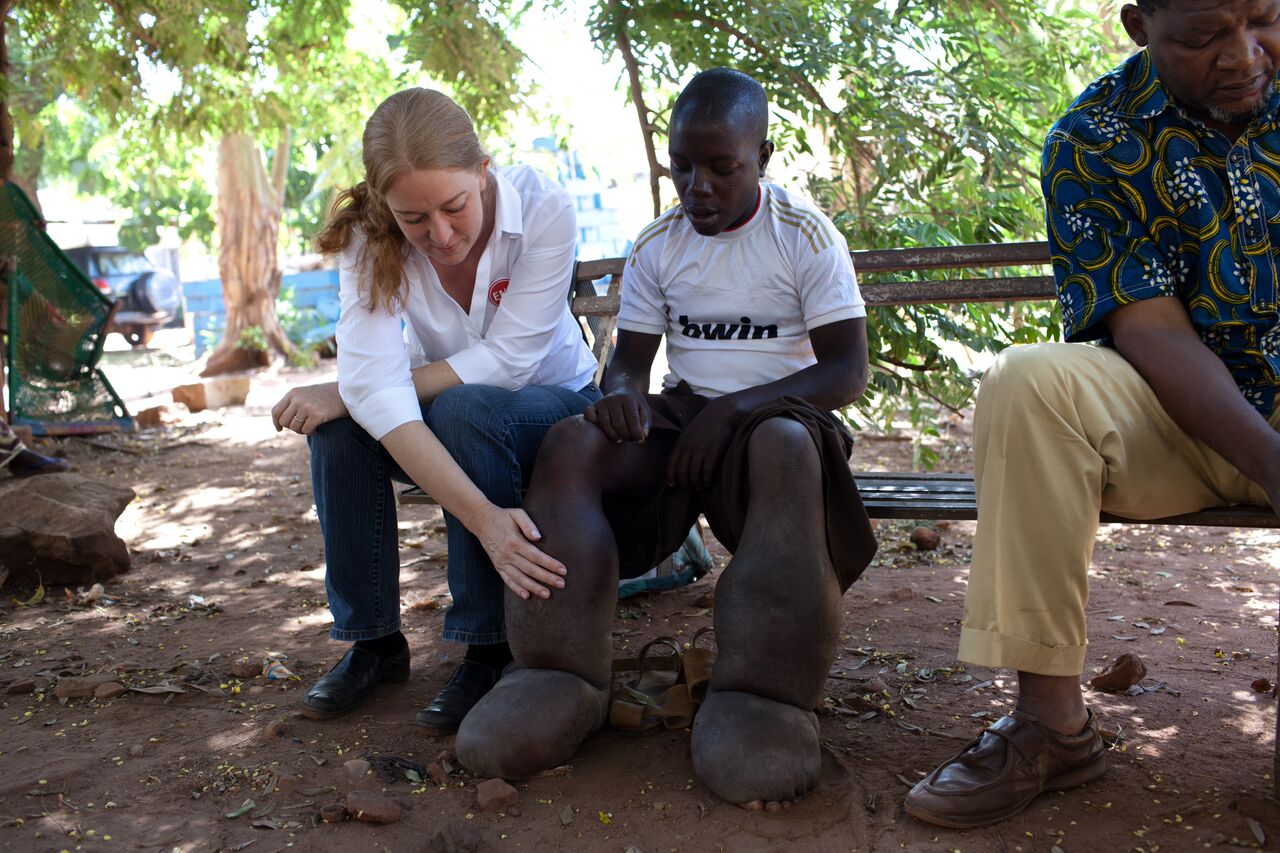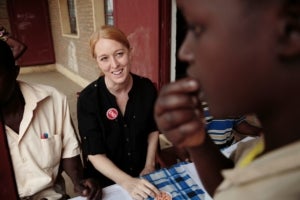
Ellen Agler, left, CEO of the END Fund. (Photo Credit: The END Fund)
The END Fund CEO, Ellen Agler, runs the private philanthropic initiative focused on controlling and eliminating neglected tropical diseases (NTDs). She spoke at Spotlight Health on June 24th on a panel called “Bringing New Drugs to the World.” We caught up with Agler to learn more about her career and what it takes to eliminate neglected diseases.
You began your career as a journalist. What made you change your
trajectory to focus more on international development and humanitarian
organizations?
Ellen Agler: I really loved my years as a journalist. I am inherently a curious person who loves to learn, to listen, and to deeply understand people’s stories and lives. But I definitely had a tendency to get attached to the stories I covered and want to do more. I remember covering a story about the Idaho Commission of the Blind and I ended up leaving so inspired that I volunteered to make audio recordings of textbooks for blind students. And when I covered a story about the arrival and resettlement of Bosnian refugees in Boise in the early 1990s, I ended up volunteering to help families with errands and English tutoring. I remember an editor of mine at the time teasing me and telling me he thought I was in the wrong profession!
Around 1996/97, I started looking for international opportunities for service. I applied for the Peace Corps and took the Foreign Service exam. It’s so interesting to think back then that I honestly could not have named one international humanitarian service or development organization, perhaps other than the Red Cross and Doctors without Borders. But an editor of mine connected me to Operation Smile and it was a great fit. I had the chance to support medical teams providing surgery to children with cleft lips and cleft palates all across the world and see up close the challenges facing health care systems and professionals in dozens of developing countries. It was clear to me even one year into my work with Operation Smile that I had found work in global health that I loved and that I could dedicate my life to.
In a world with so much inequity, being able to connect resources to people who need it the most and weaving the worlds of the wealthiest and poorest together, and doing it effectively to make change — that continues to inspire me. I’ve felt so lucky now to be able to study international development at the London School of Economics and global health at Harvard School of Public Health and work for high-impact, partnership-oriented organizations like International Medical Corps and now the END Fund.
(Photo Credit: END Fund)
The END Fund focuses on often-neglected tropical diseases (NTDs), which affect more than 1.6 billion people globally. What are some of the challenges you
face in getting the world to pay attention to these maladies?
EA: I recently had a great discussion on this with Dr. Matshidiso Moeti, the World Health Organization’s Regional Director for Africa, who recently launched a new initiative to help African countries tackle neglected tropical diseases. She observed that often times the health agenda of developing countries is significantly influenced by external funding priorities.
Global health funding has largely been directed to diseases that cause the greatest mortality — HIV/AIDs, tuberculosis, malaria, childhood vaccine-preventable diseases, or emergent threats like Ebola or Zika. As a global health community, we have not paid enough attention to the diseases that cause long-term suffering and disability. While the five diseases the END Fund focuses on — schistosomiasis, intestinal worms, river blindness, lymphatic filariasis, and blinding trachoma — affect over 1.6 billion people worldwide, they have not been prioritized. But this is changing.
A strong coalition of partners is working to change the paradigm around these diseases — to make sure these diseases go from being seen as unavoidable to being unacceptable. I see that happening at many levels now — from community health workers and health leaders in disease endemic countries to policy leaders at the highest levels.
Recently at the World Economic Forum on Africa in Kigali, Rwanda, I was so impressed to see leaders like Rwandan First Lady Jeannette Kagame, Minister of Health Dr. Agnes Binagwaho, and Queen Sylvia, the traditional queen of Buganda, the largest tribe in Uganda, all come forward and ADVOCATE for the need to prioritize efforts to control and eliminate these diseases across the region.
In sub-Saharan Africa alone, more than 500 million people are suffering from one or more neglected tropical disease. Studies show that if current elimination targets were met, over $52 billion would be saved in the region and over 100 million healthy life years gained. There is a tremendous opportunity in front of us to increase prosperity for over a billion people worldwide. It’s a challenge, and an opportunity, that I think is compelling and really do-able in the next decade.
What impact does climate change have on tropical diseases?
EA: There have been a number of good studies and modelling done showing how climate change is a significant factor in rising rates and geographical spread of diseases like malaria, dengue, chikungunya, lymphatic filariasis, Chagas, and others. In India, for example, greater than average monsoon rainfall and high humidity enhance mosquito breeding and survival, and mosquitos are the vector for a number of tropical diseases, including now Zika. Rising waters can affect dams, canals, and irrigation, which in turn leads to increased snail habitat affecting schistosomiasis rates.
It’s estimated that globally, temperature increases of two or three degrees Celsius would increase the people at risk of malaria by several hundred million. I recently saw Al Gore speak at the Skoll World Forum on Social Entrepreneurship and he emphasized this point, and pointed to climate change links and rising rates of other diseases like West Nile Virus, Rift Valley Fever, and other conditions. It’s something a lot of us have on our radar.
What’s true is that our planet’s health and human health are inextricably intertwined. Initiatives like the Wellcome Trust’s Our Planet, Our Health are doing important work in this area. Last year the Lancet set up a Commission on Health and Climate Change, which is projecting that climate change will have an “unacceptably high and potentially catastrophic” risk to human health.
This goes beyond the impact climate change has on tropical diseases, and will affect rates of asthma and other respiratory diseases, cardiovascular disease, and undernutrition. In addition, extreme weather that results in drought, storms, and floods can directly cause increases in death and disease. It’s certainly important for us to continue to look at climate change through the lens of public health.
For humanitarian organizations focused on medical care, there is often a
tension between funding or distributing medicines to cure diseases and
their symptoms, and prioritizing community outreach for sustainable
change. How does the END Fund work to strike this balance?
EA: I don’t see these scenarios as opposed to each other, but rather complementary. In the case of NTDs, we are working to distribute medicines to reduce the prevalence and eventually eliminate these diseases. Once these diseases are eliminated, you often no longer need to treat. That is sustainable change.
Community outreach is the main method for treating these diseases through large-scale mass drug administration to all populations at risk. We’ve seen that by mobilizing thousands, sometimes tens of thousands, of health workers needed to conduct these campaigns, you are contributing to education, awareness, and community ownership of these issues, as well as strengthening health systems.
In addition, the END Fund tries to incorporate Water, Sanitation and Hygiene (WASH) education for the communities in which we work so that programs not only focus on alleviating the symptoms of the NTDs but also the behavioral factors that contribute to transmission. I think that with sophisticated health programming, you can meet direct service delivery and sustainable, systems change goals at the same time.
The world needs both: to stop immediate suffering — especially when solutions are easily available — and also to act as systems entrepreneurs working to influence and permanently improve broader health programming and policy. I believe all of us are being asked to think and act in a much more nuanced, sophisticated way in addressing these issues.


